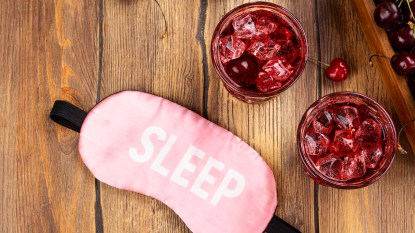The 5 Easy Tricks Experts Say Balance Your Hormones + Tame Menopause Symptoms Naturally
Slowing your breathing is one of the easiest ways to break the stress cycle that can throw hormones out of whack

Sure, hormone fluctuations are a normal part of life. But during perimenopause (the time leading up to menopause) they can be especially intense. Whether you’re dealing with hot flashes and headaches or abnormally heavy periods, you want effective relief. Here, we explain how to balance hormones naturally to tamp down your most bothersome symptoms.
Why your hormones can become out of balance
Hormones are a group of more than 50 chemical messengers responsible for various bodily processes. “They have effects starting from the top of our head all the way down to our feet,” says Bruce Dorr, MD, a board-certified Ob/Gyn and senior medical advisor at BioTE. “These effects extend to our brain, eyes, heart and bones.” But for hormones to do their job effectively, a proper balance must be maintained.
“For hormonal messages to work properly, they have to get to our cells where there are receptors,” he explains. “Once the messenger hits the receptor, they click together, which is where the magic happens. Whether for energy, oxygen or metabolism, you need those two to connect.”
Unfortunately, aging makes these connections harder to achieve. That’s because during perimenopause, estrogen and progesterone levels decline rapidly. Since these sex hormones are essential for mood, sleep and temperature regulation, many women develop symptoms that can be downright miserable.
Related: “Perimenopause Made Me Foggy and Tired — Until I Found This Natural Cure!”
How to balance hormones naturally
Hormone fluctuations are a normal part of aging, but that doesn’t mean you have to accept an awful menopause experience, says Mindy Pelz, DC, bestselling author of The Menopause Reset. “The good news is that you have a lot of sway over your hormone levels,” she notes. “A few simple diet and lifestyle habits can have a major impact on your hormones and help you find balance again.” Here’s how to balance your hormones to ease symptoms:
1. Eat like an Italian
Maria Teresa Anton, MD, an endocrinologist and educator at Miami’s Pritikin Longevity Center, says that good nutrition is one of the first things she recommends to patients suffering from hormonal discomforts. “Eating a nutritious, balanced diet can support hormone production and regulation,” she says. “Focus on whole foods, such as fruits, vegetables, whole grains, lean proteins and healthy fats,” all of which are staples in the Mediterranean diet.

Whole foods, like the kind folks eat in southern Italy, Spain, Greece and France, are an especially good way to balance hormones because they feed your gut microbiome. The human gut produces more than 20 unique hormones, and it needs essential nutrients to support the production of these hormones.
Eating foods that contain omega-3 fatty acids, like walnuts, fatty fish and flaxseed can help, too. Getting enough of this vital nutrient reduces inflammation and support healthy hormone levels, Dr. Anton adds. (Learn how much omega 3 you need daily to reap the rewards).
Proof the Mediterranean diet works: A study in the International Journal of Food Sciences and Nutrition found the eating plan supported hormones that affect energy balance. And another study in Current Opinion in Food Science suggests the Mediterranean Diet relieves menopausal symptoms.
2. Tour your neighborhood
“Exercise decreases stress hormones and helps us maintain and build muscle, which is the currency of longevity,” Dr. Dorr says. Similarly, “it can improve mood and support weight management, all of which contribute to healthy hormone levels,” Dr. Anton adds.
The hitch: Exercise is probably the last thing you want to do if you’re dealing with hot flashes and fatigue. But it doesn’t have to be complicated. Pelz, who regularly shares wellness advice on her YouTube channel, says walking is a great place to start.
“Walking is so overlooked as a way to get healthy,” she says. “Low-intensity cardio is amazing for your hormones. It improves insulin sensitivity, decreases cortisol, speeds up your metabolism and improves both cardiovascular and brain function.”
Try taking a 5- to 10-minute stroll around your neighborhood before breakfast or after dinner. As you get more comfortable, Pelz suggests gradually sneaking in a few more minutes here and there for even better results.

3. Try 4-7-8 breathing
Stress doesn’t just dampen your mood, it also affects your health. “When we’re stressed, we don’t eat right and we’re less likely to exercise,” Dr. Dorr says. “Stress also affects our hormone receptors, causing them to become hidden and less in number,” creating vicious cycle.
But finding easy ways to relax can do a world of good, Dr. Dorr assures. “When you’re able to calm the stress and anxiety in your mind, your hormones work better for you,” he explains. (See the cortisol-lowering foods that help tame tension.)
Dr. Anton echoes this advice, adding that relaxation techniques don’t have to be time-consuming or complicated. One to try: The 4-7-8 breathing technique. Research in Neurological Sciences found that deep breathing exercises like 4-7-8 improves mood and alleviates stress. And a study in Scientific Reports confirms deep breathing significantly reduces anxiety.
Here’s how to do it:
- Find a quiet, comfortable place to sit with your back straight, like in a chair or against a wall.
- Press your tongue against your upper teeth and keep it there.
- Exhale through your mouth, making a whooshing sound as you clear your lungs.
- Close your mouth and inhale through your nose as you count to 4.
- Hold your breath and count to 7.
- Exhale through your mouth while counting to 8.
- Repeat two more times for a total of 3 cycles.
Or check out the video below for a guided how-to.
4. Meet up with friends
It turns out simply socializing with friends and family can positively affect your hormones. While it won’t necessarily restore hormone balance, it can make the symptoms of perimenopause and menopause easier. “A sense of community and support with like-minded people helps with mood and can reduce irritability [associated with hormone fluctuations],” says Alyssa Dweck, MD, FACOG, a gynecologist and the Chief Medical Officer of Bonafide Health
A study out of the Duke University Institute for Brain Sciences backs this up. The researchers found that spending time with friends and loved ones releases oxytocin, a hormone that produces positive feelings. Plus it increases production of serotonin and dopamine, two other “feel-good” chemicals that help mitigate menopause-related stress.

5. Consider magnesium
When your hormones are out of balance, your sleep often suffers. A study in the Clinical Journal of Obstetrics and Gynecology found that as estrogen declines, sleep disturbances increase. It’s no wonder then that 85% of postmenopausal women and 46% of perimenopausal women report physical and mental exhaustion.
Dr. Anton’s advice: “Establish a regular sleep schedule, create a relaxing bedtime routine and make sure your sleep environment is comfortable. Aim for 7-9 hours of quality sleep per night.”
To help you clock the Zzzs you need, consider supplementing with magnesium at night. A study in the Journal of Research in Medical Sciences found that folks who took magnesium before bed slept longer and spent less time awake. One to try: Nature Made High Absorption Magnesium Glycinate Capsules, 200 mg. (Learn more about the best magnesium for sleep.)
How to balance your hormones: When to see a doctor
If menopause discomforts affect your quality of life and daily functioning, and natural remedies aren’t providing as much relief as you’d hoped, Dr. Anton recommends talking with your healthcare provider about hormone replacement therapy (HRT).
Dr. Dorr says the treatment has come a long way during the last few decades. For example, bioidentical hormone replacement therapy (BHRT) uses natural hormones derived from plants. These hormones are very similar to those produced by your body, so they’re well-tolerated and present fewer potential risks. Even better? BHRT can be customized to address the specific symptoms you’re experiencing.
For more hormone tips that boost your health:
To Boost the ‘Youth Hormones’ (HGH) That Build Muscle and Burn Fat, Do These 3 Things
This content is not a substitute for professional medical advice or diagnosis. Always consult your physician before pursuing any treatment plan.













